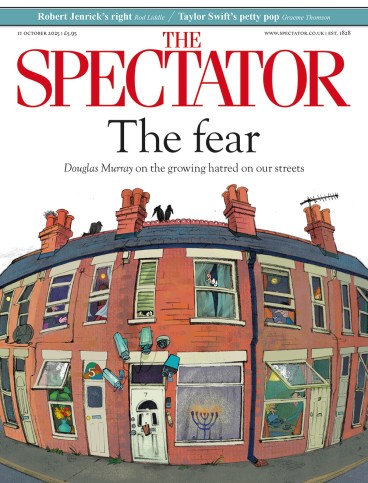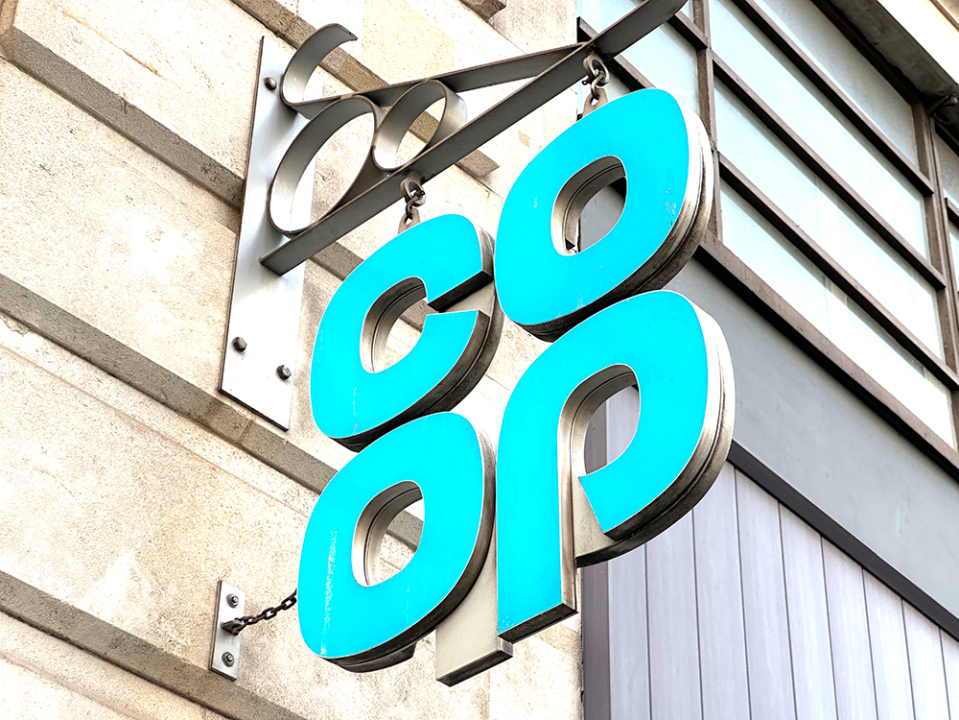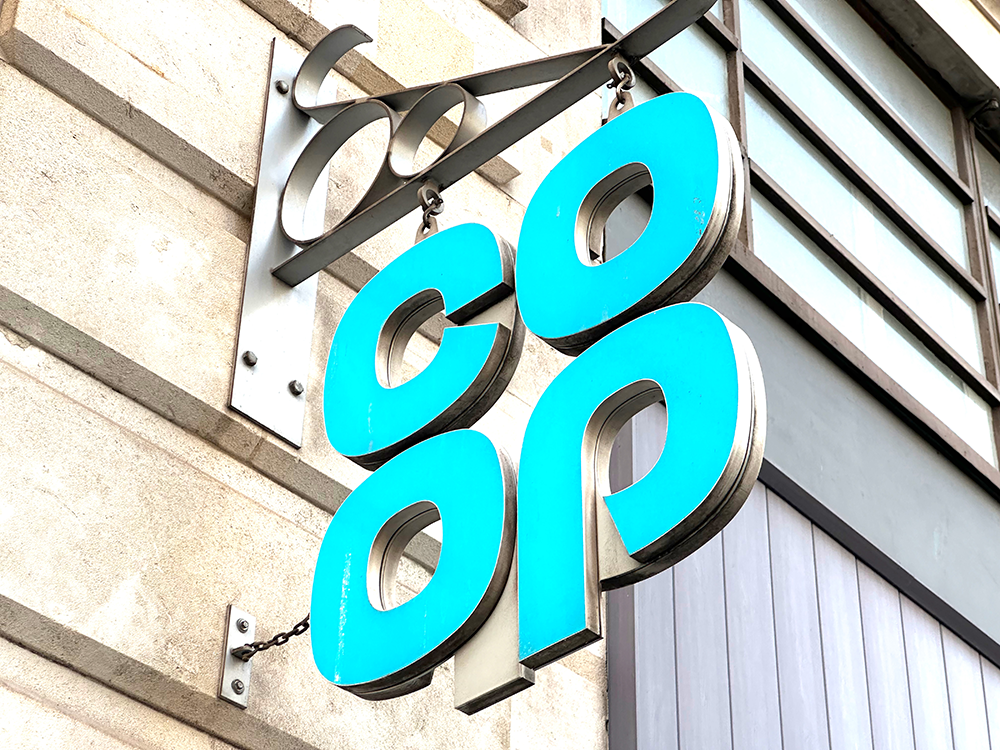
Between news bulletins of the Manchester synagogue attack last week, I popped into my local Co-op for some groceries. When the public address system said something indistinct about ‘solidarity’, I paused to listen: it was an advert for Sun & Stone lager, produced in Scotland in collaboration with Taybeh, a Palestinian microbrewery, and with a slice of any profits going to the Disaster Emergency Committee’s Gaza appeal.
The Co-op is a benign beacon of alternative capitalism, owned by its members and valued by millions of customers. At their annual meeting in June, those members voted to ‘cease all trading with Israel’, as the Co-op has also done with the likes of Belarus, Iran and Syria.
So be it, you might say: any Venn diagram of urban Co-op users and Palestinian sympathisers is very likely to show a large overlap. But to have continued playing the in-store ‘solidarity’ ad in the aftermath of the murder in Crumpsall – three miles from the Co-op’s own headquarters in central Manchester and on Yom Kippur, the Day of Atonement – was at the very least horribly insensitive, at worst blatantly hostile to Jewish customers and neighbours. Was it a central management oversight, or a deliberate decision?
I think we should be told.
Apology ale
Talking tangentially of beer, I’ve never taken to citrussy modern brews such as ‘Punk IPA’ – whose name puts me off for a start, never mind the ‘all-out riot of grapefruit, pineapple and lychee’ its maker BrewDog claims for its flavour. So I’m less sympathetic than I might be towards James Watt and Martin Dickie, BrewDog’s Scottish founders, whose venture launched in 2007 and grew through guerilla marketing tactics into a multinational beer and pub empire, but is now retreating under a barrage of bad news.
Watt was accused of ‘inappropriate behaviour and abuse of power’ in a BBC documentary in 2022. He denied the allegations but stepped back as chief executive last year; Dickie left the business this summer. After a five-year run of losses, the company has announced a round of job cuts, having closed ten of its own bars and reportedly been dropped as a supplier to almost 2,000 others.
It has also sold the Kinrara estate in the Highlands where Watt and Dickie pledged to plant millions of trees to make BrewDog the world’s first carbon-negative international beer business. But the project turned out to be smaller than first claimed, critics said the trees were struggling to grow, and the use of such offset schemes has come to be seen as a virtue-signalling substitute for genuine reduction in industrial emissions.
Entrepreneurial over-reach is forgivable, sometimes even admirable, but there’s always been a certain in-your-face aggression around the BrewDog brand that seemed to invite trouble. Perhaps its new management team should launch – for the Co-op to sell alongside Sun & Stone – an ‘apology ale’ called Hype & Hubris.
Livelier listings
As the FTSE 100 index continues to climb – up by almost a quarter since its tariff-driven dive in April – London’s new issue market also looks a tad livelier. Then again, after raising less than £200 million so far this year, that’s rather like saying Rip van Winkle has stirred and called for a cup of tea.
Among the latest to join the listings queue are Princes Group, an Italian-owned food conglomerate whose products include tinned tuna and pasta; the Beauty Tech Group, which makes wrinkle-reducing LED facemasks apparently favoured by Kim Kardashian; and more seriously, Shawbrook, a ‘challenger’ bank specialised in small-business and mortgage lending.
The Shawbrook float, expected to be valued at £2 billion, has been hailed as a vote of confidence for the London Stock Exchange because the bank was floated once before (in 2015) but, as with many promising UK businesses, it was subsequently taken off the market by private equity investors. In the meantime, it has expanded by acquisitions to become a significant source of finance for smaller companies shunned by the major high-street banks. A share offer that boosts Shawbrook’s capital to facilitate more lending in that sector (while also giving the current owners a partial exit) would show the City doing exactly what it’s supposed to do to stimulate wider economic growth.
But ambitious British tech ventures will continue to chase higher valuations across the Atlantic while our bankers and brokers scramble to pick up less sexy IPOs. And the delisting tide also continues apace – the latest being Petershill Partners, an investment firm spun out of Goldman Sachs, which is departing in a huff over the limp performance of its shares since it floated in 2021.
Overall, London still stands far lower than it should in the international capital-market league – a failing that any savvy Chancellor of the Exchequer might address urgently by slashing or abolishing stamp duty on share transactions, currently at 0.5 per cent. But has anyone in the City ever applied ‘savvy’ to Rachel Reeves?
Sibley’s Law
I’m sad to learn of the death of Nick Sibley, who was my bon vivant boss when we were bankers in Hong Kong in the late 1980s. Famed for the sharpness of his wit, he had a niche in the pantheon of my predecessor Christopher Fildes’s columns as the author of Sibley’s Law: ‘Giving capital to a bank is like giving a gallon of beer to a drunk, you know what will come of it but you can’t know which wall he will choose.’
That dictum may run contrary to my positive comment on Shawbrook above, but it’s what happened many times over, in many places, throughout Sibley’s globe-trotting career from the 1960s to the 2000s. The international banking scene of today may seem relatively well-capitalised and surprisingly sober, but mark his words and mine: financial history always repeats itself.









Comments